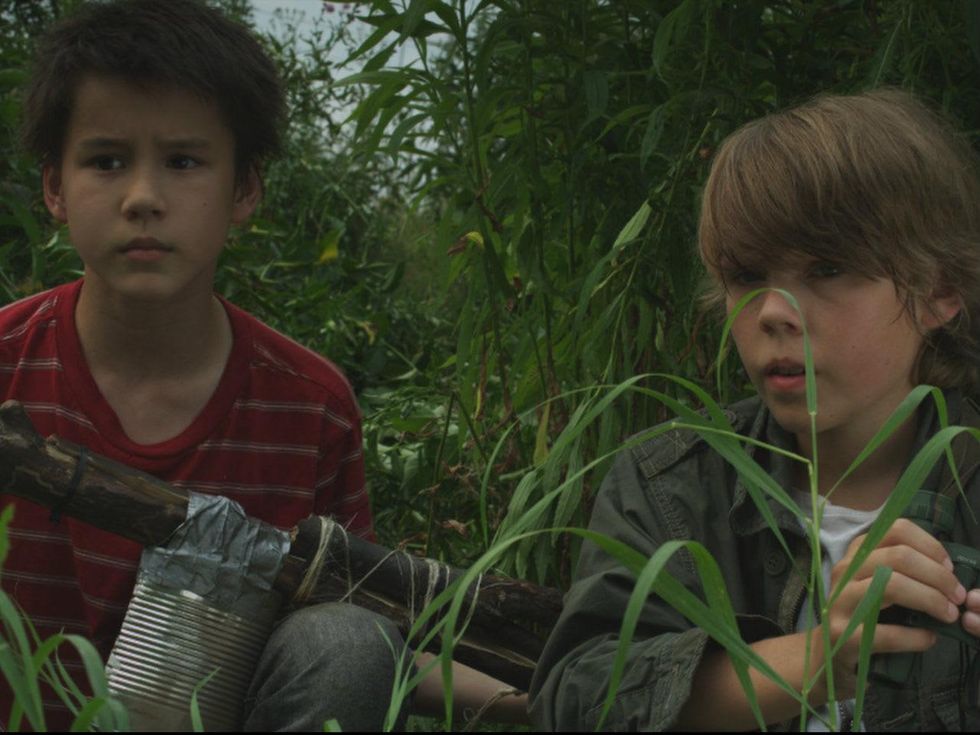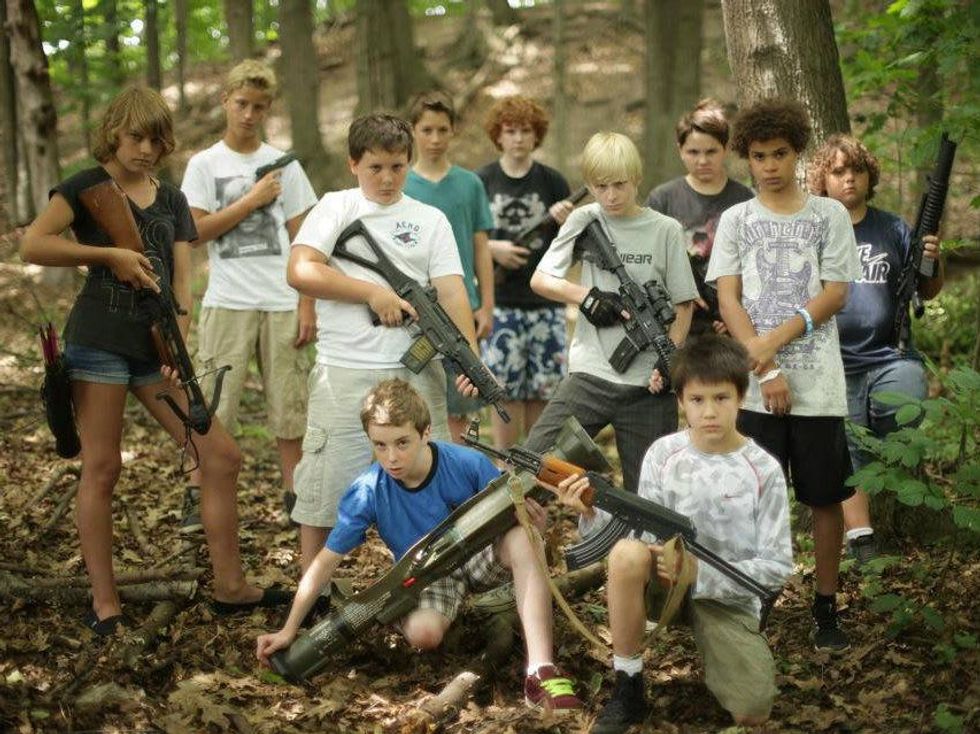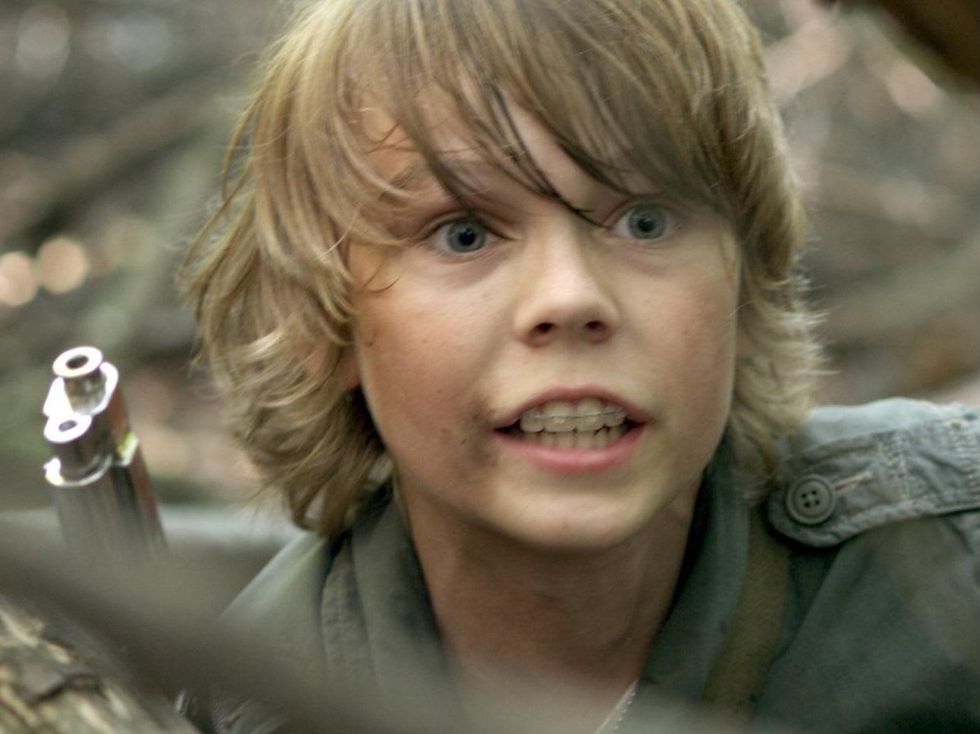The CultureMap Interview
I Declare War directors and star discuss film's brutal honesty
Imagination can be the most powerful weapon, especially if you’re fighting a make-believe war. That is just one of the themes in the latest film released by Drafthouse Films, I Declare War, a film about a group of kids whose imaginary war creates some very real tension.
I Declare War opens in theaters August 30 and is available for digital download and video on-demand. CultureMap sat down for a chat with screenwriter/director Jason Lapeyre; director Robert Wilson; and actor Gage Munroe, the young star who plays General PK.
CultureMap: This film takes places outdoors and with a full cast of kids. Where did you guys film, and what was that experience like?
"I’ve played similar games with friends and that’s how it goes," says actor Gage Munroe. "It’s the most authentic that it could be."
Jason Lapeyre: It was a 21-day shoot — budgeted for 20 but it went for 21 — and we shot it at Provincial Park in Toronto where [director Robert Wilson] actually played war when he was that age, so it was a huge flashback for him.
Robert Wilson: It was funny, because the location scouts and everybody knew a place from their childhood, and they brought us to that place and said, “Why don’t you look at this place. This is how I remember it.”
CM: Gage, was this your first major film project?
GM: I did a few films before this. I’m going on the record: I’m not doing that stage thing. I’ve never done, and I don’t know if I’ll ever do any stage productions. But, yeah, I’ve done a few films before I Declare War.
JL: All of the actors in the film are professional actors with varying degrees of experience.
CM: But it must have been a completely new experience for everyone involved to shoot a movie like this one.
RW: When was the last time you saw a movie that was carried [for] 90 minutes by 12-year-olds? So it was new for us too, and for them.
CM: All of the actors went through actual weapons training before the film, so what was that like?
GM: I was actually at a cartoon recording that day, but they had a boot camp, and I had a very quick but thorough crash course with our stunt coordinator and our armorer. They were really good about catching me up on what I was doing, and I was thrown into it pretty quickly.
I think we ended up being pretty comfortable, and I thought the battle scenes turned out really well.
CM: What were the actors' parents' responses after reading the script? It’s pretty intense in many ways, both emotionally and physically.
GM: I think all of the parents of the cast understood all of the themes and all of the language that were going into the movie were for the benefit of the film in trying to make it the most real and authentic film about kids playing war that they could.
RW: It was non-exploitive.
JL: Yeah, right from the beginning the parents understood that Rob and I weren’t doing this to exploit language and violence; it was all in the service of telling an emotionally accurate story.
GM: We had pretty much experienced the themes in the movie already in life, so it’s not a stretch.
JL: All of the actors would come up to us and say, “This has happened to me.”
CM: Gage, when reading the script and shooting the movie, did the dialogue and scenes — written by an adult — ring true and make sense to a young person such as yourself?
GM: It made a lot of sense to me. I mean these guys played war tons of times. I’ve played similar games with friends, and that’s how it goes. They’re not sugarcoating it because it would make it fake. It’s the most authentic that it could be.
CM: The film really doesn’t hold back with language, which Robert has pointed out harkens back to films like The Goonies or Stand By Me, in which kids swore a lot.
RW: Kids swear. I swore. Jason swears. Gage I’ve heard occasionally swears, although not so much in his real life.
There was freedom in the language. There was a reality to reading that script and letting the actors role with that, to the point where we knew it was so real that we didn’t need to think about the consequences of ending up with an asset that was compromised because of 12-year-olds dropping f-bombs — with machine guns.
CM: But as serious as the film’s subject can be, it still comes across as a fun experience during production.
RW: A film always looks fun to make when it’s made.
LJ: There is an underlying stress during the production of any film, but there are a lot of highlights every day, just because on the floor we could tell how great the performances were, and we were getting great stuff. At the end of every day there was a light of high-fiving going on, because we felt great about what we were doing.
GM: I remember in the rough cut just after we shot it, and I remember seeing some of the scenes and some of the battle scenes, and that’s were it looked and I knew that it was working.
---
I Declare War is currently available on iTunes, VOD and for digital download now. It hits theaters August 30.




